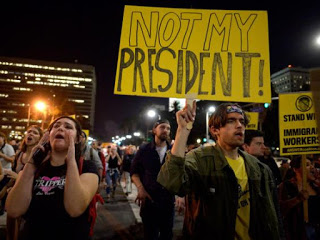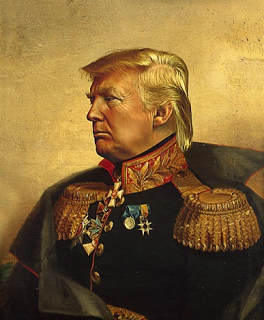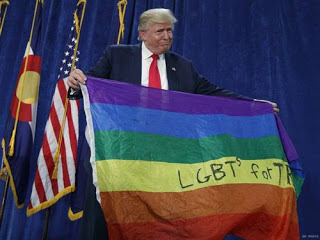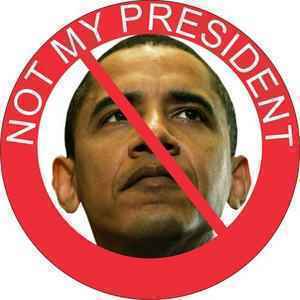 |
| No, he isn't -- unless you consent to be ruled. I don't know why anyone would. |
“How small, of all that human hearts endure, that part which laws or kings can cause or cure.”
When Samuel Johnson wrote those measured words of welcome
consolation, kings generally behaved with more restraint than presidents do
now. The essential wisdom of his observation remains intact even our era of
world-bestriding chief executives who have access to power not imagined by sages
such as Johnson, the Framers who created the office, or even, for that matter, unalloyed
despots like Lenin and Hitler, each of whom murdered millions but couldn’t
vaporize people on a whim.
Though he presides over a vast apparatus of coercion and
punitive violence, the U.S. president falls well short of the divine status
often imputed to him. Most importantly, he has no constitutional authority to “rule”
anybody, and is the “leader” only of those who choose to follow him. And, may
God be praised for it, the president does not “run” the country.
It is difficult for me to comprehend a life so sterile that
it becomes meaningless unless it finds validation through the election of a
presidential candidate, yet lives of that kind are quite commonplace. This is
proven by the flood-tide of pathos resulting from the nation-wide meltdown of
campus-dwelling leftist snowflakes – and by the triumphalist gloating from collectivists
of a different flavor who believe that the “greatness” of the United States is
defined by the identity of the federal government’s executive figurehead. Their
continent-spanning conniption fit demonstrates that at a level below sentience
they understand the essential function of the state they worship – destruction of
property, disruption of productive lives, and violence against the innocent.
Frank Herbert’s literary
masterpiece was an elaboration on the following insight: “Power
attracts pathological personalities. It is not that power corrupts but that it
is magnetic to the corruptible.” For all of its substantial flaws the U.S.
Constitution does embody, however imperfectly, the insight that corruptible
human beings cannot be entrusted with power, especially in an executive
capacity.
The presidency, as originally conceived, was custom-designed
to be occupied by Washington, who was seen by many Americans as worthy of
becoming a hereditary monarch. The Framers, acting on John Locke’s
insight that “the reigns of good princes have been always the most dangerous to
the liberties of the people,” deprived that office of most of the attributes
that would entice those who lusted for power. The president, once again, was to be a
servant, not a ruler.
Many believed that Washington was well-suited to the
exercise of power, but the Framers understood that there is no such thing as a
genuinely benevolent ruler. As Locke warned, the acts of such men become
inimical to liberty “when their successors, managing the government with
different thoughts, would draw the actions of those good rulers into precedent
and make them the standard of their prerogative – as if what had been done only
for the good of the people was a right in them to do for the harm of the
people, if they so pleased….”
This point was made more recently by commentator Jimmy Dore
of the progressive news site The Young Turks. During the Democratic primary,
Dore – like many of his colleagues -- was an outspoken critic of Hillary
Clinton. After the nominees were selected, Dore consistently warned that
Clinton was not going to prevail against the populist tide that was propelling
Trump’s campaign. As a more doctrinaire progressive, Dore preferred Bernie
Sanders – but as someone who remembered, and took seriously, his High School
civics classes, Dore was more concerned about the dangerously distended powers
of the presidency itself.
Speaking
in the immediate aftermath of Trump’s victory, Dore emphasized that a
Trump administration would inherit from Barack Obama a fully operational police
state, with all-encompassing warrantless surveillance and a legal mechanism
allowing the indefinite detention of U.S. citizens who are suspected of being
“unlawful combatants.”
“We’ve allowed our government to get rid of habeas corpus,”
Dore lamented. “We’ve allowed our government to have a complete 24-hour
surveillance system. That’s the opposite of liberty. That’s the opposite of
freedom.”
“People were warned when they did this,” he continues, but
liberals and progressives insisted that “it’s OK, because everybody likes
Barack Obama right now. But what happens if there’s a next president – and
nobody predicted Trump then, but now here we are.”
Dore and his fellow panelists also noted that by declining
to seek the prosecution of officials who committed acts of torture during the
Bush administration, Obama effectively decriminalized the practice – which his
successor has promised to implement and expand.
Of course, the same lamentation would be offered by
conservatives in the election aftermath had Obama’s police state been inherited
by Hillary Clinton. In a political environment increasingly defined by Lenin’s
maxim that the only relevant question is “Who does what to whom?” neither of
those factions is terribly concerned about the “what” in that equation – and
the Bill of Rights is supposed to define the “what” in terms of things the
government cannot do to the individual, no matter who presides over the
executive branch.
The greatness of America is inversely proportionate to the
role government plays in the daily lives of its citizens. Hillary Clinton
embodied the conceit that no facet of life anywhere on the planet should be a
refuge from the totalitarian impulse to “improve” human conduct through the
application of state-licensed violence.
Donald Trump’s ambitions aren’t as vast, and he acts out of
impulse rather than ideology – specifically, the impulse to punish others. His
campaign was devoted to recovering “greatness,” rather than restoring “liberty.”
One of his most persistent refrains was “We have no choice” – a phrase that would serve as a coda to a proposal involving torture, or mass deportation, or invasive surveillance of a religious minority, or some other expansion of state power at the expense of the individual. His consistent critique of Obama – who currently presides over a half-dozen foreign military conflicts and has ordered the summary execution of US citizens by drone strikes – is that he is too “weak” in exercising the powers of his office, when he has actually been far from diffident in that regard.
One of his most persistent refrains was “We have no choice” – a phrase that would serve as a coda to a proposal involving torture, or mass deportation, or invasive surveillance of a religious minority, or some other expansion of state power at the expense of the individual. His consistent critique of Obama – who currently presides over a half-dozen foreign military conflicts and has ordered the summary execution of US citizens by drone strikes – is that he is too “weak” in exercising the powers of his office, when he has actually been far from diffident in that regard.
A constitutionalist would describe Obama’s weakness as an
inability to restrain himself in the exercise of power. Those who understand
the state to be a malignant fiction recognize that the exercise of power is
itself an unqualified evil. No honest observer will discern in Donald Trump, an
individual whose life has been a constant hymn of self-celebration, the
smallest hint of a capacity for self-restraint.
Since the Republicans control both houses of Congress, Trump
won’t face the external restraints afforded by partisan gridlock. His ignorance
of the Constitution being comprehensive, Trump doesn’t understand the legal
restraints on the office he will hold. The insouciant
disregard for contractual commitments he routinely displayed in his business
career indicates that he wouldn’t consider himself bound by those
restraints if he did understand them.
Trump’s victory on November 8 shocked people who take
opinion polls seriously, but it didn’t surprise those who followed the political
prediction markets. Given the superior predictive ability of
investment markets, there is ominous significance in the fact that Trump’s
victory sent prison stocks skyward in anticipation of a dramatic
expansion of what is already the world’s largest carceral system.
The throngs who gleefully chanted “Lock her up!” at Trump
rallies are the kind of people who think our country is under-policed and our
prisons are under-populated. Hopefully, their fever will eventually break, and
they will recover their capacity for reflection. At that point they should
consider a
parable found in Armando Valladares’s memoir Against All Hope, which describes his decades
of captivity in Fidel Castro’s gulag.
For most of his 22 years of incarceration as a political
prisoner, Valladares was confined in the “Model Prison” on the Isla de Pinos.
It was constructed under the reign of Cuban military dictator Gerardo Machado
in the 1930s, and at the time it was regarded as ridiculously outsized, given
that Cuba wasn’t overrun by violent criminals.
When his advisors asked why he would order construction of
such an unnecessarily large prison, General Machado blithely replied: “Don’t
you worry. Somebody will come along who’ll manage to fill it up.”
“That somebody,” Valladares grimly wrote, “was Fidel
Castro.”
It has been said that every ruler builds a house another
will inherit. A better way of expressing that insight is that every ruler
expands the architecture of oppression, thereby fortifying the prison in which
his subjects – and their children – will live. This is true even – no, especially -- of rulers who supposedly
have a democratic mandate to exercise violence on behalf of the collective.
Seven years ago, at the beginning of Obama’s reign,
attendants at Tea Party rallies often displayed signs advertising that the
occupant of the White House was “Not My President.” Obama’s partisans denounced
that sentiment as seditious. The same slogan has now been adopted by
participants in anti-Trump tantrums – and the underlying sentiment is now being
denounced by people who had once seen that phrase as a form of patriotic
poetry.
Apart from employees of the executive branch, or active-duty
members of the military who have been called into service by Congress, no
American really has a “president.” The office was intended to be peripheral to
the daily concerns of Americans, rather than the central focus of their
existence. What a wonderful thing it would be if Americans of all persuasions
adopted the motto “Not My President” – and then learned to regard the state
itself with the proper mixture of hostility and contempt.
This week's Freedom Zealot Podcast: What Obama built, Donald Trump now inherits --
Please check out the new Libertarian Institute, featuring contributions from such indispensable thinkers as Scott Horton, Sheldon Richman, and many other luminaries of liberty!
Dum spiro, pugno!
Please check out the new Libertarian Institute, featuring contributions from such indispensable thinkers as Scott Horton, Sheldon Richman, and many other luminaries of liberty!
Dum spiro, pugno!




8 comments:
Why would anyone want cancer?
Why would anyone want to die?
You don't want a president, move. I'm sure the prime ministers, dictators, kings, or others will work better for you.
I rarely hear a utopian fallacy.
Buy a boat, go on to the high seas, and you will have no rulers or sovereigns. Or to Antarctica where it would be logistically difficult to rule over you.
The US President and the Federal Government replaced 13 despots in 13 tyrannies with one.
I have no idea why people think liberty is natural, or should be free of any cost in blood, sweat, time, or treasure.
The Atheists might have an excuse since they can believe man is perfectible.
Christians have no such excuse. Man is fallen. When offered the poisoned chalice of power - and I will not exempt economic power - they will corrupt themselves and others. To simply remit the price of our sins it took a Crucifixion after a scourging. If you wouldn't pay such a price personally to avoid damnation, what of the price to avoid mere temporal tyranny?
I am perfectly willing to accept and/or even fight for an alternative. But it would be a fight, not merely another whiny screen which I've heard over my entire life - a whine not unlike the liberals, black lives matter, or women regretting an encounter complaining about some oppression but unwilling to take up arms, or even go through that side of due process.
Winters here are hard, but the only answer is to move or insure you have heat, or dress warmly.
Politics are a bit different, but you can choose to vote with your feet. And I'd say please do before complaining more. Or find a way to solve the problem, not merely complain about the status quo.
Death is inevitable. Being subject to a US president is a choice.
My point is not that I don't want a president; it is that under the terms of the Constitution I don't have one.
Consult Article II, section 2 of that document. In three austere paragraphs it presents an exhaustive description of the appointment, supervisory, and enforcement powers of the office of the presidency. You will (or at least should) notice that not a syllable found therein extends presidential power over individual private citizens, or mandates a duty on their part toward that official.
Since I have not enlisted in the military (the question of belonging to the unorganized citizen militia was rendered moot by the Dick Act of 1902) nor degraded myself by seeking employment in the executive branch, I am not presided over by the official who resides in the Oval Office, something that provides me with great comfort.
Where the exercise of usurped power is concerned, it is immeasurably more patriotic to complain than to comply. And I have no interest in abandoning the country that I love to people who are destroying it through competing varieties of statist idolatry.
I know this is perhaps tangential, but how do you answer a voter who says he voted for Trump because he did not want his guns confiscated or to have nuclear war with Russia? Those potentials being far from out of the question concerning Hillary's ilk.
Both of those concerns are entirely valid where Hillary was concerned, and given Trump's longstanding pre-campaign convictions there remains reason for concern with respect to the right to keep and bear arms: He is the first presidential candidate to win an election after making specific promises of targeted civilian disarmament (via stop-and-frisk and the "no-fly/no-buy" list).
Trump has been commendably averse to confrontation with Russia. He has been much more bellicose toward Iran, and this morning's news brings the unwelcome but not unexpected tidings that the unspeakable Frank Gaffney has joined the "national security" transition team, where he, Michael Flynn, and James Woolsey will reinforce each other's worst instincts.
It's fascinating to me that Trump saw nothing objectionable about Hillary's character, conduct, or priorities until about a year-and-a-half ago. He publicly supported the disastrous Libyan intervention, for example. His presidency will likely be much more conventional than his leftist detractors fear, and his conservative supporters hope.
The problem that must be considered now is the rupture that has taken place within the libertarian community with regard to Donald Trump. Half the libertarian community is ecstatic, the other half in agony. How to account for this ? The most ecstatic of the libertarians seem to be those most solidly grounded in the Rothbardian concept of libertarianism. Now while Rothbard was the most radical in being anti-state pro market he was simultaneously the most tactical with regard to maneuvering within the existing political structure. Rothbard always underscored the great necessity of knowing both history and economics a point he makes so well in a series of lectures available on youtube about American economic history starting with the Civil War. I think Rothbard's encyclopedic knowledge of both American history and economics allowed him to view American elections in terms of their underlying movements, in terms of great historical cycles and revolutions rather than primarily in terms of individual candidates. I think for Rothbard and his present day disciples this past election represents a tactical popular rebellion against the political class and therefore against political control itself. Rothbard would interpret it as Titanic shift away from domination under the state and toward the promised land of anarcho-capitalism. On the other hand half the libertarian community reads this election primarily in terms of the personality of Donald Trump. Trump is petty. Trump is vindictive. Trump is ignorant. Trump may have derivatively profited from government bureaucracies. Trump is narcissistic. Trump is vulgar. Trump is ostentatious. Where Rothbardians are quite thrilled with what they regard as a grand historical popular libertarian revolution, the more purely ideological libertarians have recoiled at Trumps election because they interpret it largely in terms of Trumps personality failings and his failure to articulate support for or even be aware of full on pure form anarcho-capitalism.
Will,
I am disappointed to see you use the term "alt-right" here. I see this term as nothing more than the latest label de jour used by leftists to describe anyone who falls to the right of Mao Zedong. I have yet to see anyone offer a sensible description of what the alt-right is or who occupies it. Perhaps you would be willing to enlighten me?
jk
In the essay above I used the expression "alt-right" in reference to a caricature of Donald Trump that was originally published by someone who claims that label. The Cultural Marxist Left didn't coin that expression, although they use it with the opportunistic imprecision we would expect. I've not used the term much because I've yet to develop an adequate understanding of that it means, and whether those who identify themselves using it represent a movement or a passing fad.
Steve Sailer, who is not a leftist by any definition, offered a very good survey article on this subject at The American Conservative: http://www.theamericanconservative.com/articles/rise-of-the-alt-right/
Here is Sailer's brief treatment of the origins of that term, as explained by Richard Spencer, who claims credit for inventing it:
"At a recent press conference in DC, Spencer explained that the core of alt-right thought is race. Race is real, race matters, race is foundational to human identity. You cannot understand who you are without race. Many people would agree—at least privately or partially—with the first two assertions, but the third is the critical one, and has never been true historically or sociologically. (Not that there haven’t been groups of self-proclaimed pan-Asian or pan-African intellectuals who sought to make it true. Spencer fits into their tradition.) In any case, Spencer hopes somehow to spur whites into a kind of pan-white racial consciousness and galvanize them to become `aware of who we are,' and to prepare themselves, one day somehow, to form a white ethnostate."
I don't think that concern is shared by all, or perhaps even most, of the people who have coalesced around the alt-right. It seems undeniable that ethnic collectivism is the movement's center of gravity.
As I've said on many occasions, I have no problem in principle with the existence of more than one polity in the land mass that is presently called the continental United States. If people want to set up ethnically homogenous communities, and do so without injuring the property rights of others, I do not object to that ambition. The eagerness of alt-right figures to promote and now embrace the imperial presidency suggests to me that their ambitions involve consolidating power, not decentralizing it.
A little more than a year ago I did a podcast dealing with the leftist panic over Spencer's effort to establish a think tank in Whitefish, Montana. That furor reminded me a great deal of the moral panic exhibited by people of a different ideological bent whenever a Muslim community wants to establish a mosque.
Reconciliation (or even mere lessening of hostility) with Russia coupled with renewed or increased hostility with Iran are oxymoron but that doesn't seem to enter into the Trump 'national security' equation as put to the public. One wonders whether this is because those 'experts' surrounding Trump believe such distinction is too much for Trump to grasp or too much for the dumbed down American public to absorb, or perhaps cynically do not wish the distinction to be examined in the larger public forum because it might cause people to actually think or it is because they cannot competently make the distinction themselves. In any case, this does not bode well. Another Trump groupie deserving mention in relation the Iran animus is none other than Rudy Giuliani.
If Hillary would slowly but inexorably (alone the lines of enjoy inflicting as much suffering as possible along the way) march us to a larger conflict with Russia, this new cast of clowns could 'cut to the bone' much more quickly. Was Hillary's inevitable slowly tortured death preferable to a 'more merciful' quick death by Trump? Borrowing from elsewhere, 'the good news is Hillary lost, the bad news is Trump won.'
An aside, I did, for a very long time, believe in the founders vision in ways similar to yourself but cynicism has at last overtaken that belief:
"In any democracy, ethics, self restraint, tolerance and honesty will always take a second seat to narcissism, avarice, bigotry & persecution, if only because people who play by the rules in any democracy are at a disadvantage to those who easily subvert the rules to their own advantage" (Ronald’s Maxim)
Good stuff per usual Mr Griggs, thank you for the excellent endeavor and your ongoing dedication. Principled people should count for something in this world but I fear are akin to a rapidly vanishing or endangered species...
Post a Comment